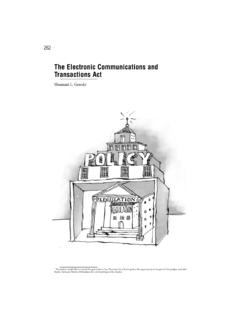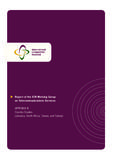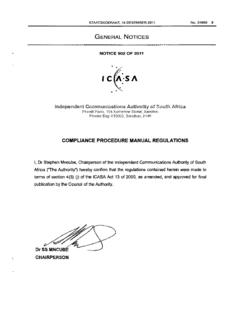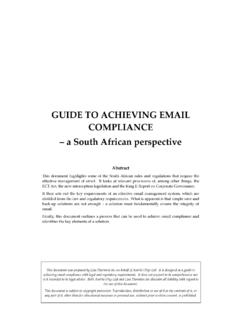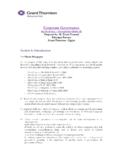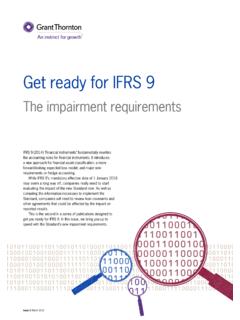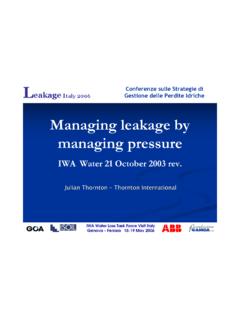Transcription of The Regulation of the Interception of - Thornton
1 The Regulation of the Interception ofCommunications and Provision of Communication RelatedInformation ActNazreen Bawa12961 The author would like to thank the following persons for reviewing parts of previous drafts: Lisa Thornton , Deshni Pillay, Tanya Scott,Fatimah Essop and Adele RegIntercepComm 5/10/06 2:15 PM Page 296297 IntroductionIn November 1995, the South African Law Reform Commission2(SALC)undertook to review and rationalise South Africa s security legislation withspecific regard to international norms, the interim Constitution3and thecountry s changed circumstances and part of this broad investigation, the SALC prioritised the area of interceptionand monitoring of communications for crime investigation and intelligencegathering, and it appointed a Project Committee to advise it and to considerdocumentation generated during the course of this investigation.
2 The interceptionand monitoring ofcommunications was prioritised, as sophisticatedtelecommunication services4were increasingly being used to perpetrate crime,especially organised crime, heists, and other serious violent crimes. In addition, theSALC was of the view that since the promulgation of the Interception andMonitoring Prohibition Act, 127 of 1992 (IM Act) on 1 February 1993, there hadbeen an increase in the use of advanced telecommunications technologies, includingcellular communications, satellite communications, computer communicationsthrough e-mail, as well as the electronic transfer of information and , the considerable legal developments across the world regarding theinterception of communications made a review of the IM Act necessary.
3 The SALC took the approach that legal provision should be made for law-enforcement agenciesto be equipped with the necessary tools to investigate crimes that usedtelecommunications directly, as well as other concomitant crimes, such as money-laundering. The SALC contended that a review of the existing legislation, inparticular the IM Act, would ensure that emphasis would be on indicated in its long title, the IM Act is directed at prohibiting theinterception of certain communications, monitoring certain conversations orcommunications.
4 Providing mechanisms for the Interception of postal articles andcommunications as well as the monitoring of conversations or communicationswhen a serious offence is committed or the security of South Africa is deals with the issues of monitoring and Interception separately. The primaryobjective of the IM Act is not crime prevention but the protection of confidentialinformation6from illicit allows the state to intercept andmonitor conversations and communications under certain conditions and inaccordance with directives issued in terms of the IM the promulgation of the Judicial Matters Amendment Act, 55 of 2002 the South African Law Commission, as established by theSouth African Law Commission Act, 19 of 1973.
5 Has become the South African Law Reform Commission (hereinafter referred to as theSALC ).3 Constitution of the Republic of South Africa, Act 200 of Telecommunication service is defined in the Telecommunications Act, 103 of 1996 as including any service provided by means of atelecommunication system. A telecommunication system is defined as any system or series of telecommunication facilities or radio,optical or other electromagnetic apparatus or any similar technical system used for the purpose of telecommunication, whether or notsuch telecommunication is subject to rearrangement, composition or other processes by any means in the course of their transmissionor emission or reception.
6 Telecommunication , in turn, is defined as the emission, transmission or reception of a signal from one pointto another by means of electricity, magnetism, radio, other electromagnetic waves, or any agency of a like nature, whether with orwithout the aid of tangible Report Review of Security Legislation Project 105: The Interception and Monitoring Prohibition Act (Act 127 of 1992),October1999 (hereinafter referred to as the SALC Report ) para the IM Act did not define confidential information, in Protea Technology Limited and Another v Wainer and Others[1997] 3B All SA 594, 603, the Court remarked as follows.
7 That expression must surely mean such information as the communicator does not intend to disclose to any person other than theperson to whom he is speaking and any other person to whom the disclosure of such information is necessary or impliedly to berestricted. I think that there is a distinction between confidential information and private Holdings Ltd v Eckstein1996 (2) SA 693 (N) at 700;S v Kidson 1999 (1) SACR 338 (W) at Bawa11 RegIntercepComm 5/10/06 2:15 PM Page 297 During October 1999, after extensive public consultation, the SALC Report wassubmitted to the Minister of Justice and Constitutional Development forconsideration.
8 It included an extensive review of the IM Act and was compiled withreference to, and in comparison with, similar legislation in France, theNetherlands, Belgium, Germany, Britain, the United States, Hong Kong comparison with international law illustrated that in the past decademany other countries had similarly reconsidered and reviewed their interceptionand monitoring legislation, predominantly for reasons relating to crimeprevention and national security. Many of the aforementioned countries havedeveloped new legislation to conduct surveillance and monitoring ofcommunications (commonly known as wiretapping or bugging ).
9 The SALC was of the view that even though the IM Act compares favourablywith its counterparts in other countries, it does not deal adequately with newtechnology (eg, the IM Act does not deal with the monitoring of employees e-mailby employers). For that reason the SALC recommended that it be substantiallyrepealed and replaced with new this end, the SALC recommended a new draft bill, which culminated in thepromulgation of the Regulation of the Interception of Communications andProvision of Communication-Related Information Act, 70 of 2002 (ROICA)
10 On 22 January will come into operation on a date to be fixed by thePresident by proclamation in the Government was drafted inresponse to the increasing diversity and developments in communicationtechnologies, globalisation of the telecommunications industry, and theconvergence of the telecommunications, broadcasting and information technologyindustries, which inter alia include satellites, optical fibres, computers, cellulartechnology, e-mail, surveillance equipment, and the electronic transfer ofinformation and data.
